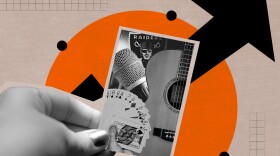Sports have been around for thousands of years, whether it’s the Greek Olympics or the gladiator matches of the Roman empire.
Those competitions were for the pride and the glory of one nation’s athletes defeating those of another nation. And the same holds true, many times today.
Sports can though, feel tribal — one tribe trying to show their dominance over another.
At the same time, sports are big business. Las Vegas has three professional teams and more are on the way. But does the business aspect supersede the passion people have for sports?
Assistant Professor of History in residence at the University of Nevada, Las Vegas, John Haberstroh, has introduced a new course focusing on ancient sports. The class has students learning about different sports from the olympics of ancient greece, to the lesser known ancient sports of Mesoamerica and Asia.
"Each individual class is devoted to a particular region of the world," said Haberstroh. "And we look at secondary scholarship. So, articles, book chapters by scholars of ancient sports, and we examine how these authors discuss these ancient sports and then my job is to sprinkle in some of our ancient evidence for these ancient sports. Then, towards the end of the semester, we culminate the experience with a real life, in person sports day, so to speak. I put out a variety of random sports equipment, and the students [are] tasked with inventing their own sport, and kind of put them in the shoes of perhaps what ancient people might have had to go through when devising a sport."
But apart from the knowledge and activities the students do, Haberstroh hopes students understand how sports plays a part in everything from economics, to politics. And perhaps most importantly, the idea that studying ancient history can help us understand ourselves better in the present day.
"Ultimately sports are never just sports," said Haberstroh. "Sports will always have political or religious significance. There's economic aspects that are inseparable from sports. By studying the lives and experiences of ancient peoples, we can take it as an as an exemplar of how we should strive to be, or we can reject it wholesale and say, those folks did things in a weird way, and we don't want to do that. And it allows us to reflect and shape our own contemporary world. The ancient world is just kind of our laboratory that we work in and and be critical about but ultimately, it's to help us understand ourselves."
Now, as mentioned before, sports are big business. The Vegas Golden Knights Hockey Team recently won the Stanley Cup and they bring thousands of fans to T-Mobile Arena every year, Allegiant Stadium hosts a plethora of sports events, and the Oakland A's major league baseball team are likely to move to Las Vegas and have a stadium built for them with the passing of the Oakland A's tax bill in the Nevada State Legislature this month. But, just like with many things in life, there are always two sides to the same coin. On the one hand, the Vegas Golden Knights incite passion and hope for fans; while on the other, the Oakland A's tax bill isn't universally acclaimed by Nevadans.
But why so much passion, whether it be positive or negative for a seemingly simple thing like sports? Can ancient history answer some of these questions for us? Haberstroh has an answer.
"Sports exist, because political authorities allow it to exist," said Haberstroh. "Sports exists because it satisfies some type of societal need to appease the gods or ensure that there's a proper harvest. Sports exist for entertainment. People want to see a competitive match, or they want to see the religious ritual carried out in the proper way. And when sports events are happening, people get hungry, people are thirsty, people need clothing. So there's all types of kind of ancillary industries that attach themselves to the sports industry, in antiquity and today. To provide concessions, to provide a payroll and lodging. Sports, in many ways, stimulate an economy. We've been doing this for a very long time, this is not a modern phenomenon."
Haberstroh also takes his passion for ancient history further with his role in the national non-profit, Save Ancient Studies Alliance.
"We are made up of an international group of volunteers," said Haberstroh. Our job is to engage the public with ancient studies broadly defined, and we're basically an online organization. Everything we do is through social media, YouTube, etc. We also put on live events where everything we do is free for the public. You don't just have to go to school to study these things, or to learn about these things to satisfy your curiosity. My role in the saving studies alliance is I'm the access team leader, so our group creates materials to lessen the barriers to studying ancient studies. We're creating databases of online resources, curating lists of colleges and universities that offer programs, and we're working on translation projects and things like that."
Haberstroh also thinks that in the advent of exponential technological growth in things like artificial intelligence, robotics, and technology, it's especially important to not neglect studying the past.
Haberstroh plans to offer the ancient sports class every other year at UNLV.
Guest: John Haberstroh, assistant professor-in-residence, UNLV










